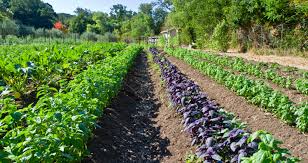In recent years, organic farming has gained widespread recognition as a sustainable agricultural practice that emphasizes natural methods and environmental stewardship. This article explores the principles, benefits, and practices of organic farming, highlighting its significance in promoting ecological balance, producing healthy food, and reducing environmental impact. The article concludes with a focus on the importance of organic farming certification courses in equipping farmers and enthusiasts with the knowledge and skills needed to embrace organic practices effectively.
Understanding Organic Farming
Organic farming is a holistic approach to agriculture that prioritizes the health of ecosystems, soil fertility, and consumer well-being. It encompasses a set of principles and practices designed to work with natural processes rather than against them. Key principles of organic farming include:
1. Soil Health: Organic farming focuses on nurturing soil health through practices like composting, crop rotation, and the use of organic fertilizers. Healthy soil supports robust plant growth and enhances nutrient availability.
2. Biodiversity: Organic farms prioritize biodiversity by cultivating a variety of crops, maintaining natural habitats, and avoiding monoculture. This diversity helps naturally control pests and diseases, reduces reliance on chemicals, and supports ecosystem resilience.
3. Natural Pest and Weed Management: Organic farmers use biological controls, such as beneficial insects and crop rotation, to manage pests and weeds. Mechanical methods like hand weeding and mulching are also employed, minimizing the need for synthetic pesticides and herbicides.
4. Avoidance of Synthetic Inputs: Organic farming prohibits the use of synthetic pesticides, fertilizers, growth regulators, and genetically modified organisms (GMOs). Instead, natural alternatives like botanical extracts and organic amendments are utilized to maintain plant health and fertility.
Benefits of Organic Farming
Organic farming offers numerous benefits that contribute to environmental sustainability, public health, and economic viability:
1. Environmental Sustainability: By promoting soil health and biodiversity, organic farming helps conserve natural resources, reduce water pollution, and mitigate climate change. Practices like cover cropping and reduced tillage improve soil structure and enhance carbon sequestration.
2. Healthier Food: Organic produce is free from synthetic chemicals and pesticides, making it a safer and healthier option for consumers. Studies suggest that organic foods may contain higher levels of beneficial nutrients like antioxidants and lower levels of pesticide residues.
3. Economic Opportunities: Organic farming can be economically advantageous for farmers due to higher market prices for organic products and reduced input costs over time. Certification allows farmers to access premium markets and capitalize on growing consumer demand for organic foods.
4. Community and Social Impact: Organic farming fosters community resilience by promoting local food systems, supporting small-scale farmers, and encouraging sustainable agricultural practices. It also enhances rural livelihoods and contributes to food security.
Core Practices in Organic Farming
Organic farming encompasses a range of practices tailored to soil health, crop management, and sustainable agriculture:
1. Crop Rotation: Rotating crops helps break pest and disease cycles, improves soil fertility, and reduces the need for synthetic inputs. Leguminous crops, like beans and peas, are often included in rotations to fix nitrogen naturally.
2. Composting and Organic Amendments: Compost, animal manure, and green manures are used to replenish soil nutrients and improve soil structure. These organic amendments enhance microbial activity and promote nutrient cycling in the soil.
3. Integrated Pest Management (IPM): IPM strategies in organic farming involve monitoring pest populations, using natural predators, and implementing cultural practices to minimize pest damage. This approach reduces reliance on chemical pesticides and preserves beneficial insects.
4. Water Management: Organic farming emphasizes efficient water use through practices like drip irrigation, mulching, and soil moisture conservation. Healthy soils with improved water-holding capacity can withstand drought conditions and reduce water runoff.
Organic Farming Certification Course
To effectively transition to organic farming and comply with organic standards, farmers and agricultural professionals can benefit from organic farming certification courses. These courses provide comprehensive education on organic principles, practices, and certification requirements. Participants gain practical skills and knowledge in:
1. Organic Standards and Regulations: Certification courses cover national and international organic standards, including guidelines set by regulatory bodies like the National Program for Organic Production (NPOP) in India or the United States Department of Agriculture (USDA) in the United States. Understanding these standards is essential for achieving and maintaining organic certification.
2. Soil Health Management: Courses emphasize soil fertility, composting techniques, and organic nutrient management. Participants learn how to improve soil structure, enhance microbial diversity, and maintain soil health through organic practices.
3. Pest and Disease Management: Certification courses teach participants integrated pest management (IPM) strategies, biological control methods, and cultural practices for pest and disease prevention. Participants learn to identify pests, assess pest damage thresholds, and implement organic pest control measures effectively.
4. Crop Planning and Management: Participants learn crop selection, planting techniques, and crop rotation strategies to optimize yield and productivity in organic systems. Courses also cover organic seed sourcing, seed treatment, and crop protection methods compatible with organic farming principles.
5. Certification Process: Understanding the certification process is critical for farmers seeking organic certification. Certification courses guide participants through the application process, inspection requirements, record-keeping obligations, and annual renewal procedures.
Conclusion: Organic Farming Certification Course
In conclusion, organic farming certification courses play a pivotal role in advancing sustainable agriculture and supporting the organic farming sector. By equipping farmers and agricultural professionals with knowledge and skills in organic principles, practices, and certification requirements, these courses promote environmental stewardship, enhance farm profitability, and meet consumer demand for organic products. In India and globally, organic farming certification courses contribute to the growth of the organic sector, ensuring that farming practices align with sustainability goals and benefit both farmers and consumers alike. Embracing organic farming through certification courses represents a commitment to ecological integrity, food safety, and long-term agricultural sustainability.





Comments